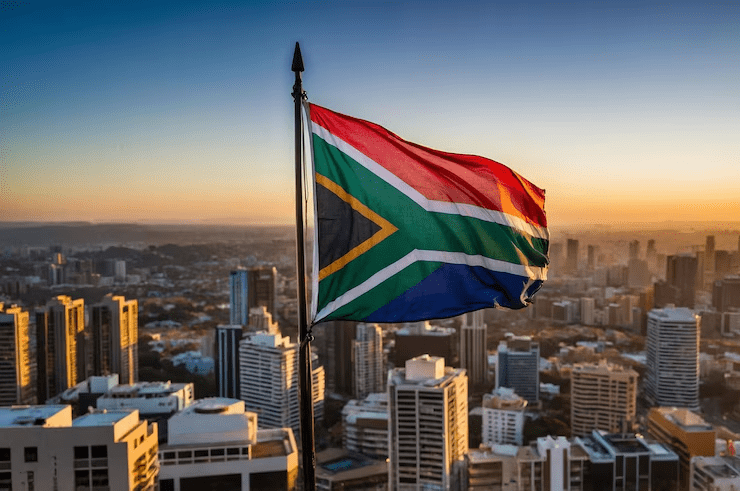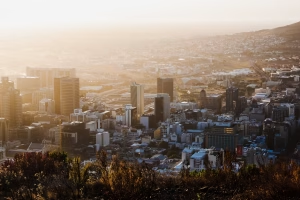Lakes in South Africa are among the country’s most underrated natural treasures. From vast freshwater reservoirs to hidden mountain lakes and coastal lagoons, these water bodies offer stunning scenery, rich biodiversity, and peaceful escapes from busy city life.
Whether nestled in national parks or lying beneath dramatic cliffs, each lake has something unique to offer. They’re perfect for both adventure seekers and those looking for a quiet nature retreat.
In this guide, we’ll explore some of the most beautiful and fascinating lakes the country has to offer.
1. Lake Chrissie

Lake Chrissie is South Africa’s largest natural freshwater lake by surface area. Located in Mpumalanga’s highveld near the town of Chrissiesmeer, this tranquil lake is surrounded by over 270 smaller pans and supports an incredibly rich ecosystem. Often referred to as “Matotoland” (land of frogs), Lake Chrissie is a peaceful paradise for nature lovers and birdwatchers.
Highlights:
-
Home to over 280 bird species, including flamingos and herons
-
Rich in frogs and amphibians, nicknamed “Matotoland”
-
Believed to lie atop a meteorite impact site
-
Offers excellent freshwater fishing (tilapia and carp)
-
Seasonal wildflower blooms surround the lake in spring
Location: Chrissiesmeer, Mpumalanga
Entry Fee: Free (fees may apply for guided tours)
Timings: Open 24 hours
Activities: Birdwatching, fishing, hiking, stargazing, nature photography
Nearby Restaurants: Miss Chrissies Country Kitchen, Chrissiesmeer Bistro, Die Pandok
Suggested Read: South Africa Visa for Indians
2. Lake Sibaya

Lake Sibaya is South Africa’s largest freshwater lake, contained entirely within the country’s borders. It’s a key part of the iSimangaliso Wetland Park, a UNESCO World Heritage Site, and offers raw natural beauty and cultural significance.
Highlights:
-
Largest natural freshwater lake in South Africa (77 km²)
-
Protected within the iSimangaliso Wetland Park
-
No inlets or outlets; fed by underground aquifers
-
An important breeding site for hippos and crocodiles
-
Outstanding snorkeling and kayaking opportunities nearby
Location: iSimangaliso Wetland Park, KwaZulu-Natal
Entry Fee: Free (fees apply for park access)
Timings: Open 24 hours
Activities: Kayaking, wildlife watching, snorkeling, camping
Nearby Restaurants: The Wetlands Restaurant (Sodwana), Mseni Restaurant, Leatherback Seafood
Suggested Read: South Africa on a Budget: The Ultimate Travel Guide
3. Lake St. Lucia

Source: wikipedia
Lake St. Lucia is a massive estuarine lake system that stretches over 80 km along the KwaZulu-Natal coast. It’s the centerpiece of the iSimangaliso Wetland Park and home to one of the most diverse ecosystems in the southern hemisphere. A favorite for safari-goers and nature buffs, this lake teems with life both in and around the water.
Highlights:
-
One of Africa’s largest estuarine systems
-
Over 800 hippos and 1,000 crocodiles inhabit the lake
-
UNESCO World Heritage Site
-
Supports flamingos, pelicans, and marine species
-
Offers both river and ocean activities in one place
Location: St. Lucia, KwaZulu-Natal
Entry Fee: R60–R100 per person (within the park)
Timings: 6:00 AM – 6:00 PM
Activities: Boat safaris, birdwatching, fishing, estuary cruises
Nearby Restaurants: Braza, Reef and Dune
Suggested Read: Best Beaches in South Africa
4. Gariep Dam (Lake Gariep)

Source: wikipedia
Lake Gariep, also known as Gariep Dam, is the largest man-made lake in South Africa.
Located on the Orange River between the Free State and Eastern Cape, it spans over 370 square kilometers. It’s a hub for water sports, scenic drives, and fishing, making it a popular stop on long road trips across the interior.
Highlights:
-
Largest man-made lake in South Africa
-
Source of hydroelectric power and irrigation
-
Stunning views of the Karoo landscape
-
Hosts sailing regattas and festivals
-
Key location for barbel and yellowfish fishing
Location: Norvalspont / Bethulie, Free State / Eastern Cape border
Entry Fee: Free (fees for boat hire or accommodation)
Timings: Open 24 hours
Activities: Sailing, fishing, camping, hiking, and dam tours
Nearby Restaurants: Tjailatyd Restaurant, Gariep A Forever Resort Restaurant, Siloam Coffee Shop
5. Lake Fundudzi

Source: wikipedia
Lake Fundudzi, nestled in the Soutpansberg Mountains of Limpopo, is a spiritual lake steeped in Venda tradition and legend. Formed by a landslide, it’s one of the few true inland lakes in South Africa. Revered by the local community, access is traditionally limited, preserving its sanctity and pristine surroundings.
Highlights:
-
One of South Africa’s only natural inland freshwater lakes
-
Deeply sacred to the Venda people
-
Surrounded by misty mountains and indigenous forest
-
Legends include a sacred python and ancestral spirits
-
Often seen with a “barrier of mist” guarding its entrance
Location: Near Thohoyandou, Limpopo
Entry Fee: Permit required via the local chief or tour operator
Timings: By arrangement only
Activities: Guided cultural tours, photography, sightseeing
Nearby Restaurants:Nandoni River Lodge Restaurant, Royal Hills Lodge Dining, Khoroni Hotel Bistro
Suggested Read: Honeymoon in South Africa – Top Romantic Places
6. Wilderness Lakes
A chain of lakes, including Langvlei, Rondevlei, and Island Lake, forms the Wilderness Lakes system on the scenic Garden Route. These lakes are ideal for kayaking, birdwatching, and serene family getaways. The region is part of the Garden Route National Park and boasts wetlands, forests, and sandy shores.
Highlights:
-
Recognized as a Ramsar wetland of international importance
-
Ideal for canoeing and stand-up paddleboarding
-
Surrounded by fynbos and indigenous forest
-
More than 230 species of birds have been recorded
-
Excellent for family-friendly picnics and swimming
Location: Wilderness, Western Cape
Entry Fee: Free (some park access may have small fees)
Timings: Open 24 hours
Activities: Canoeing, birdwatching, swimming, hiking
Nearby Restaurants: The Girls on the Square, Salinas Beach Restaurant, Pomodoro
Suggested Read: Hiking in South Africa
7. Lake Eland
Lake Eland is a small but picturesque lake located in the Lake Eland Game Reserve in KwaZulu-Natal. It may not be as large as others on this list, but its location in a private reserve adds exclusivity. The lake is ideal for quiet paddling, fishing, and relaxing under acacia trees.
Highlights:
-
Located within a private game reserve
-
Surrounded by cliffs, valleys, and wildlife
-
Zipline and suspension bridge offer panoramic lake views
-
Wildlife includes zebra, eland, and wildebeest
-
Well-maintained picnic and braai areas
Location: Lake Eland Game Reserve, near Oribi Gorge, KwaZulu-Natal
Entry Fee: R70 per adult (subject to change)
Timings: 7:00 AM – 6:00 PM
Activities: Ziplining, game drives, picnicking, kayaking
Nearby Restaurants:Lake Eland Restaurant, Leopard Rock Coffee Shop
8. Sterkfontein Dam

Source: wikipedia
Sterkfontein Dam is known for its strikingly clear blue water, thanks to minimal sediment and pollution. It lies in the foothills of the Drakensberg mountains in the Free State and is a favorite for windsurfers, fly fishers, and hikers. The surrounding Sterkfontein Nature Reserve adds to its peaceful appeal.
Highlights:
-
One of the deepest dams in South Africa
-
Crystal-clear, algae-free water is ideal for fly fishing
-
Located at the edge of the Drakensberg Escarpment
-
Popular with campers and photographers
-
Habitat for the endangered Bearded Vultures is nearby
Location: Near Harrismith, Free State
Entry Fee: Free
Timings: Open 24 hours
Activities: Fishing, hiking, windsurfing, camping
Nearby Restaurants: Platberg Restaurant, The Coffee Patch, Bergville Wimpy
Suggested Read: 20 Best Festivals In South Africa You Must Experience
9. Kamfers Dam

Source: wikipedia
Located just outside Kimberley in the Northern Cape, Kamfers Dam is renowned for its flamingo population. It is one of only four breeding sites of the lesser flamingo in Africa.
Though the lake has faced ecological challenges, it remains a crucial bird habitat and offers spectacular birdwatching opportunities.
Highlights:
-
Major breeding ground for lesser flamingos
-
An artificial flamingo island was created for nesting
-
Excellent birdwatching and photography
-
Important conservation and rehabilitation area
-
Vibrant pink flocks are visible from the N12 highway
Location: Kimberley, Northern Cape
Entry Fee: Free (best viewed from a distance)
Timings: Open 24 hours (viewing areas may vary)
Activities: Birdwatching, photography
Nearby Restaurants: Butlers Restaurant, Occasions Coffee Shop, Mugg & Bean Kimberley
Suggested Read: Temples in South Africa: A Heritage of Faith & Culture
10. Nandoni Dam
Nandoni Dam is a relatively new but fast-growing tourist destination in Limpopo. It supplies water to Thohoyandou and nearby communities and has become a prime spot for fishing competitions, water sports, and relaxation. The surrounding area includes lodges and cultural villages offering authentic Venda experiences.
Highlights:
-
Built in the early 2000s, now a regional water hub
-
Excellent for fishing: barbel, bass, tilapia
-
Jet skiing and speed boating are available
-
Cultural tourism is linked to Venda traditions
-
Scenic drives and well-developed picnic spots
Location: Near Thohoyandou, Limpopo
Entry Fee: Free
Timings: Open 24 hours
Activities: Fishing, boating, picnicking, cultural tours
Nearby Restaurants: Nandoni Paradise Lodge Dining, Khoroni Hotel Buffet
11. Groenvlei Lake
Groenvlei is a hidden freshwater lake just inland from Sedgefield on the Garden Route. It’s the only lake in the region not connected to the sea and is ideal for bass fishing. Surrounded by forest and dunes, the lake is serene and less crowded than nearby coastal attractions.
Highlights:
-
Separated from the sea by forested dunes
-
Known for largemouth bass fishing
-
Quiet and uncrowded, ideal for nature retreats
-
Scenic trails in the Goukamma Nature Reserve
-
Crystal-clear, calm waters are perfect for canoeing
Location: Sedgefield, Western Cape
Entry Fee: R50 per adult (within Goukamma Reserve)
Timings: 7:00 AM – 6:00 PM
Activities: Fishing, canoeing, hiking, swimming
Nearby Restaurants: Montecello, Trattoria Da Vinci, Wild Oats Market (Saturdays)
Suggested Read: Things Not to Do in South Africa
Why Choose OneVasco?
OneVasco makes visa applications effortless. Our expert team manages the entire process, allowing you to focus on your journey.
-
Enjoy stress-free travel with fast visa approvals.
-
Expert and Personalized Support
-
Efficient and Hassle-Free Process
-
Real-Time Tracking and Updates
-
Transparent Communication
-
Trusted by Millions
FAQs
1. How many lakes are in South Africa?
South Africa has hundreds of lakes, including natural freshwater lakes, coastal lagoons, and man-made dams. While not all are named or mapped, notable ones include Lake Chrissie, Lake Sibaya, and Gariep Dam.
2. Are the lakes in South Africa man-made?
Many lakes in South Africa are man-made, such as Gariep and Sterkfontein Dams, built for water storage and power generation. However, several natural lakes exist too, like Lake Sibaya and Lake Fundudzi. Both types are popular for tourism and wildlife conservation.
3. What is the most beautiful lake in South Africa?
Lake Sibaya is often considered the most beautiful due to its unspoiled setting within the iSimangaliso Wetland Park. Surrounded by coastal forest and dunes, it offers crystal-clear water and rich biodiversity.
4. Can you swim in the lakes in South Africa?
Yes, swimming is allowed in several lakes in South Africa, such as those in the Wilderness Lakes area or Groenvlei. However, some lakes may have crocodiles, hippos, or strong currents, so it’s important to check safety guidelines and signage before swimming.
5. What is the best time to visit South Africa’s lakes?
The best time to visit South Africa’s lakes is during the dry months, from May to September. These cooler months offer pleasant weather, better wildlife sightings, and fewer insects. For wildflower viewing or water activities, spring (September to November) is also ideal.
6. What activities can you do at the lakes in South Africa?
Lakes in South Africa offer a variety of activities, including fishing, kayaking, birdwatching, swimming, boating, hiking, and picnicking. Many lakes are in nature reserves or parks, making them ideal for wildlife viewing and eco-tourism.
7. Is there an entry fee for lakes in South Africa?
Many lakes are free to access, especially those near public roads or towns. However, lakes within national parks or private reserves may require entry fees ranging from R50 to R150.
8. Are pets allowed at South Africa’s lakes?
Pet policies vary by location. While some public lakes allow dogs on leashes, most lakes within nature reserves or national parks restrict pets to protect wildlife. It’s best to confirm with each site.





















